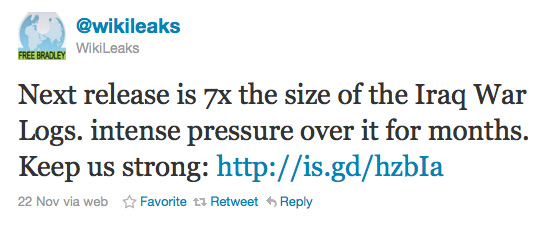Just hours after the arrest of Julian Assange in London, the Australian has published an op-ed piece by the WikiLeaks founder in which he places the organisation squarely among the media firmament:
“Democratic societies need a strong media and WikiLeaks is part of that media”, argues Assange. “The media helps keep government honest. WikiLeaks has revealed some hard truths about the Iraq and Afghan wars, and broken stories about corporate corruption.”
The piece begins with a quote from a young Rupert Murdoch, who said in 1958: “In the race between secrecy and truth, it seems inevitable that truth will always win.” A particularly poignant statement, given that WikiLeaks is now in the fight of its life: trying desperately to stay online amid sustained cyber attacks; facing possible prosecution under any law the US attorney general can find to fit the bill; and press coverage of the leaks diverted by the arrest of its founder and editor-in-chief for alleged sex crimes.
The attacks on WikiLeaks have come thick and fast from many fronts, but, as Assange points out in his op-ed, the newspapers that published secret diplomatic cables by its side are not suffering anything like the same treatment:
WikiLeaks is not the only publisher of the US embassy cables. Other media outlets, including Britain’s the Guardian, the New York Times, El Pais in Spain and Der Spiegel in Germany have published the same redacted cables. Yet it is WikiLeaks, as the co-ordinator of these other groups, that has copped the most vicious attacks and accusations from the US government and its acolytes.
Assange goes on to claim that his organisation has coined “a new type of journalism”, which he calls “scientific journalism”.
We work with other media outlets to bring people the news, but also to prove it is true. Scientific journalism allows you to read a news story, then to click online to see the original document it is based on. That way you can judge for yourself: is the story true? Did the journalist report it accurately?
His call for journalism to adopt something more akin to a scientific method are not new. It echoes comments he made back in July, prior to the release of Afghanistan and Iraq war logs and the US embassy cables:
You can’t publish a paper on physics without the full experimental data and results, that should be the standard in journalism. You can’t do it in newspapers because there isn’t enough space, but now with the internet there is.
As he has done for many years in defence of his own organisation, Assange raises the issue of the Pentagon Papers as he closes his piece:
In its landmark ruling in the Pentagon Papers case, the US Supreme Court said “only a free and unrestrained press can effectively expose deception in government”. The swirling storm around WikiLeaks today reinforces the need to defend the right of all media to reveal the truth.
